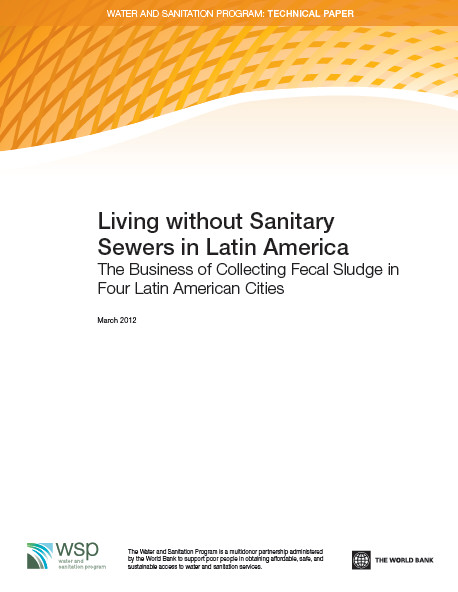Living without Sanitary Sewers in Latin America
 |
The Business of Collecting Fecal Sludge in Four Latin American Cities
rapport Mar 2012 ; 60 pages
Ed. WSP - Washington
Téléchargeable sous format: PdF
Téléchargeable chez l'éditeur
Abstract:
The present report spotlights the major challenges and the opportunities that lie ahead in fecal sludge management and summarizes the findings from four case studies that describe the current and potential market for sludge removal, collection, and disposal in peri-urban areas. These areas, inhabited by a variety of ethnic, religious, and cultural groups, typically struggle with high population density, insufficient land use planning, high citizen insecurity, and low coverage with basic services.
The report demonstrates how technical, financial, environmental, social, regulatory, political, and institutional Living without Sanitary Sewers in Latin America Executive Summary factors interact to create supply and demand in four markets where coverage with sanitary sewerage services is below the regional average, namely: Santa Cruz (Bolivia), Guatemala City (Guatemala), Tegucigalpa (Honduras), and Managua (Nicaragua).
Even though households in the four areas studied have onsite sanitation systems (latrines and toilets), fecal sludge and excreta often drain into the streets, and there is no control or treatment of the sludge, posing a risk for public health and the environment.
Mots clefs: |
Amérique latine (CI) (DT) (OP) (ope) , assainissement (CI) (DT) (OP) (ope) , boues (gestion des ) (CI) (DT) (OP) (ope) , péri-urbain (CI) (DT) (OP) (ope) , urbain (CI) (DT) (OP) (ope) |
Editeur/Diffuseur: |
|
WSP
-
Water and Sanitation Program - Washington - Etats Unis |
En cas de lien brisé, nous le mentionner à communication@pseau.org